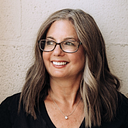Life was normal until it wasn’t #MOC19
I can’t even remember the first time I heard of #COVID19, which seems strange given how quickly and completely it has changed our lives.
I’m a news junkie, so I’d read about the spread of the virus overseas, and the first confirmed case in the U.S. back in January. Still, it seemed to be concentrated on the West Coast, so for us on the East Coast life went on as normal.
As the confirmed cases inched closer to Connecticut, I was concerned, but not scared. Then on March 6th, one of the students in my Friday 5pm class who works at Danbury Hospital came in and announced that someone had tested positive for COVID-19.
That was the first case in Connecticut. A mere sixteen days later, we’re up to 415 confirmed cases and 10 deaths.
Back in those early days of March, I didn’t feel panic. I bought some extra pasta, peanut butter, quinoa, and frozen vegetables, in case we had to be quarantined. My husband told me I was overreacting, but I argued that we’d eat it all eventually even if life went on as normal.
Spoiler alert: Life did not go on as normal, and my husband has since told me that I was being prudent, not overreacting.
The first time I felt real panic was six days after my student told me about the first COVID-19 case, on March 12th. We’d already been told that we were going to move to distance learning for two weeks following break, and that if we left the state of Connecticut we had to self-quarantine for fourteen days. At that time, the biggest thing I was worried about was not being able to visit my daughter in D.C., because I hadn’t seen her since Thanksgiving.
Yeah I know. Silly me.
On Thursday 12th, I spent the morning doing training on the platforms I would need to use for our two week distance learning stint. While doing that, I received an email from the provost saying that I should cancel my Friday 5pm writing class because students had to be out of the dorms.
I left Danbury after teaching my Thursday afternoon class, but before I even made it home, there was a text from WestConn saying that all of Friday classes were cancelled.
That’s when the panic set in — a panic that only deepened when I went grocery shopping, and shelves were bare. No toilet paper. No paper towels. No hand sanitizer. No antibacterial wipes. No tuna fish. No pasta. As a writer, I’m trained to look at the oddities of human behavior, so I made a note of which shelves and cabinets were empty and which were full. I couldn’t help noticing that while the frozen vegetable cabinet was empty, the ice cream cabinet was full.
Seriously? Am I the only one who stress eats?
March 17th was the five-year anniversary of my mom’s sudden and unexpected death. As I visited the cemetery, I couldn’t help wondering if I’d be taking my place there sooner rather than later. I’m asthmatic and in my 50’s, so a prime candidate for dying from the “Boomer Killer.”
March 17th was also the day that the CSCU President Mark E. Ojakian announced that the rest of the Spring Semester would be conducted online, and that spring commencement exercises would be cancelled.
Spring Break wasn’t much of a break for professors, but in a way that’s been good. I’ve been too busy to incessantly check the news. That’s probably been better for my mental health.
Today, March 23rd, was the first day of online classes. So much has changed since I last saw my students. We’re feeling our way through this brave new online world together.
Last December, when I was putting together the syllabi for the two creative writing courses I’m teaching this semester, I choose Alexandra Kleeman’s You, Disappearing and Isaac Asimov’s The Fun They Had. Back then, what seems like a century ago in Coronavirus Years, I had no idea how much these stories would resonate by the time my students read them in late March.
Note to self: Pick happier stories next semester.
This is the first in a series of diary posts as part of Mass Observation Covid-19, (#moc19) being organized by Vance Briceland. Read about the project here.
Sarah Darer Littman is an award-winning author of books for young people. She teaches writing at Western Connecticut State University. Her latest YA novel, DEEPFAKE, comes out October 6th from Scholastic Press. Twitter: @sarahdarerlitt
